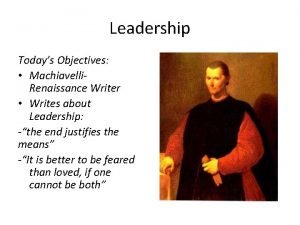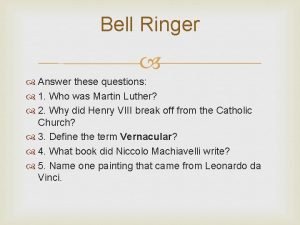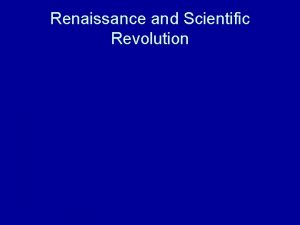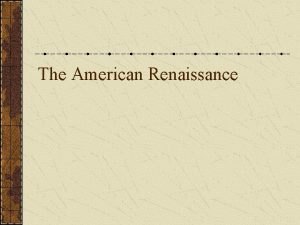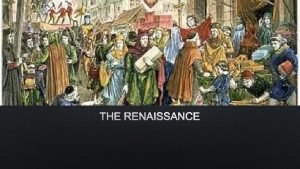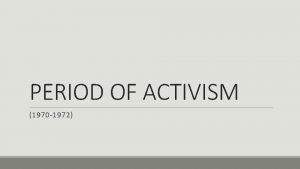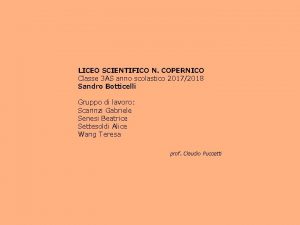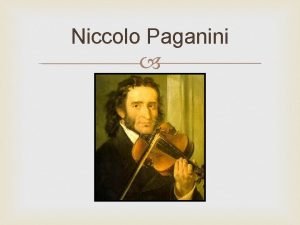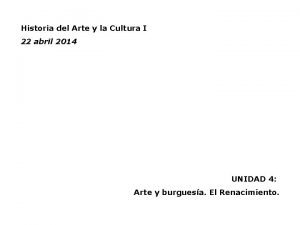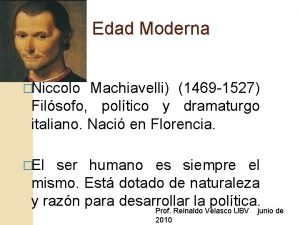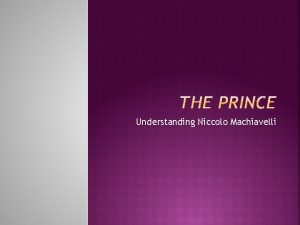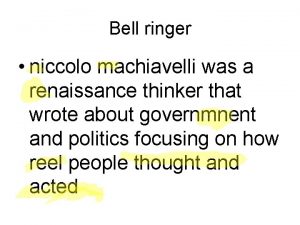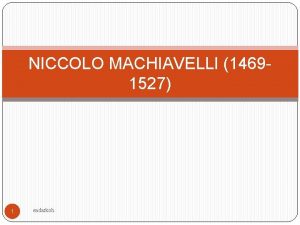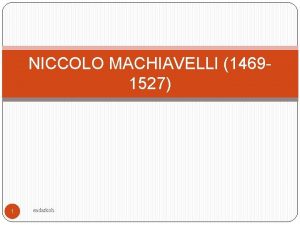WRITERS OF THE RENAISSANCE PERIOD Niccolo Machiavelli 1469














- Slides: 14

WRITERS OF THE RENAISSANCE PERIOD

Niccolo Machiavelli 1469 - 1527 Born in Florence, Italy Worked in government as a secretary becoming a diplomat. Disagreements with the leaders of Florence lead to exile.

Niccolo Machiavelli- “The Prince” Writes a letter to Lorenzo De Medici Letter becomes known as The Prince (1532) The Do’s & Don’ts of how to maintain power, regardless of Morals or Ethics Leader must set aside his own morality to achieve goals of that leader 1 st major Political Philosopher in nearly a Millennia

Niccolo Machiavelli- “The Prince” All means may be resorted to for the establishment and preservation of authority “the ends justify the mean” The worst and most treacherous acts of rulers are justified by the wickedness and treachery of the governed

Influences of Machiavelli Thomas Hobbes John Locke Thomas Jefferson Benjamin Franklin James Madison

Machiavelli’s Contemporary Influence

Desiderius Erasmus- “The Praise of Folly” Wrote satire called “Praise of Folly” (1509) Intended for Private Circulation Scourges the abuse and follies of the various classes of society Coldblooded attempt to discredit the Church and its leadership

Desiderius Eramus- “The Praise of Folly” Didn’t take aim at Christianity A true expression of faith and a strong Bible in the are makes a good leader

Machiavelli & Erasmus 1. How could each writer be considered a Humanist? Explain. 2. Compare the writing of Machiavelli and Erasmus. What does each have in common? Where does each man differ? Create a Venn Diagram or a compare and contrast chart describing what each writer has in common with each other, an what they believe independently of one another. 3. Short Essay (2 -3) paragraphs-Which writer do you agree with more? Explain why you agree with that philosopher. How do you feel that a ruler should rule? Why do you disagree with the other philosopher?

Dante Aligheri- “The Divine Comedy” Italian poet, born in Florence, Italy. “The Divine Comedy” A Journey thorough Hell (Inferno) to Purgatory (Purgatorio) and finally Heaven (Paradiso) and partake of the Beatific Vision

Dante Aligheri- “The Divine Comedy” Allegory of progress of the soul toward God Led through Hell by the Roman poet, Virgil Nine Circles of Hell

Nine Circles of Hell

Nine Circles of Hell Limbo- people waiting to see if they enter Heaven or Hell Lustful, Gluttonous and Avaricious are sins of weakness. Mostly things we do to ourselves. Wrathful, Heretics (those who betrayed other)and Violent represent sins of malice. They were premeditated and involve actions toward other people. Fraudulent and Treacherous represent sins of betrayal and pride. The worst sins of all. Satan who betrayed God represents the epitome of evil.

Assignment Develop a geography of hell. Decide which sins belong inside each circle of hell. If you think Dante’s circles are appropriate you can use them. You may use a piece of poster board. Include two or three paragraphs describing the meaning of each circle, why that circle belongs in hell.
 Niccolo machiavelli renaissance
Niccolo machiavelli renaissance Fungsi negara menurut charles e merriam
Fungsi negara menurut charles e merriam Niccolo machiavelli icivics answer key
Niccolo machiavelli icivics answer key A major renaissance work by machiavelli was
A major renaissance work by machiavelli was American renaissance writers
American renaissance writers Is a french word that means rebirth
Is a french word that means rebirth What did renaissance writers write about
What did renaissance writers write about Renaissance literature writers
Renaissance literature writers The seed of activism
The seed of activism Niccolo dead
Niccolo dead Niccolò copernico mappa concettuale
Niccolò copernico mappa concettuale Niccolò tartaglia triangolo
Niccolò tartaglia triangolo Liceo niccolò copernico
Liceo niccolò copernico Niccolo paganini powerpoint
Niccolo paganini powerpoint Berto di bartolomeo
Berto di bartolomeo
